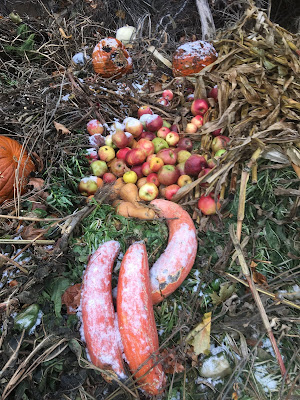Like a lot of people, this time of social distancing has
made me want to take on new projects. My favorite coronavirus project that I’ve seen is starting a
garden. With grocery stores sold out of food and posing a high risk of
contracting the virus, it’s no wonder people want alternative ways to get food.
And people are finally stuck at home, looking for things to do without leaving
their yard, so gardening is a perfect opportunity. For those of you who don’t
have space (or interest or energy or time) to make a garden, I would suggest
signing up for a CSA at a local farm to support local farmers and get food
without going to the grocery store.
But my family decided to do a slightly different project. We
already had a garden started, but we still wanted to do something
environmentally friendly. So we decided to focus on composting. We’ve had a
compost bin for many years, but mostly we just bring out vegetable scraps once
a week and forget about it. While this reduces food waste, it misses the main
benefits of compost: converting this food waste into nutritionally dense soil
to feed new plants.
So, we decided to make compost a priority. We added piles of
wood chips from recent tree work we had had done, as well as dried leaves,
because our compost was too high in “green matter” (vegetables), and it is
supposed to be 50/50 green matter with brown matter (leaves, grass clippings,
wood chips, shredded newspaper, etc.). I filled a bucket of brown matter and
left it next to our compost bin, so that now every time somebody dumps in one
bucket of vegetables they also will dump in one bucket of brown matter.
Secondly, we decided to make stirring the compost a regular task. Nobody wanted to do it before, because the compost is behind our
garage and sort of annoying to get to. So we moved our compost out to next to
the house, so that it will get more sun and be more accessible. If you don’t stir
your compost, the food isn’t exposed to oxygen, so the microbes in your compost won't be able to break it down. But, if you mix the compost
regularly, and thus expose it to oxygen, it will break down aerobically, so it won’t smell as much.
It’s not hard to set up a compost pile or bin: put a bin or
start a pile outside and keep a small bucket inside (we keep it in a cabinet
under the kitchen sink-make sure it has a lid to prevent odor) for collecting
food scraps. Collect vegetable scraps, anything not cooked and that doesn’t have
fat or oil. Then, once a week (or more or less often depending on how much you
use), bring it outside to your bigger pile. And, don’t forget to do the work to
maintain it: add brown matter, and stir it at least once a week.
In two months, you will have highly nutrient dense soil!
To learn more about composting read, check out these links:


No comments:
Post a Comment